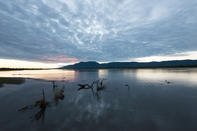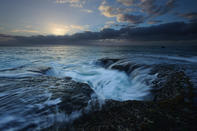Life Liquid
Water. After the air we breathe, it's pretty much everything in our day-to-day survival. As you are right now, wherever you are, about 62 per cent of you comprises a remarkable coalition of two hydrogen molecules and one oxygen. No, you're not a big slushy water balloon.

Rather, you're a collection of neatly packaged cells that keep this transparent life liquid neatly distributed throughout your system. So, next time you feel the need for some self-analysis, just stare deeply into a glass of water - you'll be sure to find some meaning.
Water, It's the key factor that separates our planet from the others sharing this solar system because our planet is the only one where H2O dominates the surface and shape-shifts between gas, liquid and solid. It covers two-thirds of Earth's surface.
If we were able to roll out the planet's crust into one, neat constant layer - literally smooth out the deepest ocean trench to the same level as Everest's peak - the entire globe would be lost beneath a 2.5 km-deep layer of the stuff.
The Planet’s Water

Only three per cent of all this quantity of water is fresh - and, of that, most is locked up in glaciers and ice sheets (nearly four-fifths in total); another one-fifth is hidden away in underground aquifers; and the fraction remaining (0.3 per cent of all freshwater) is above ground and available to you and me for our eight recommended daily glasses of it.
The rest of the planet's water makes up the most mysterious and inaccessible places on Earth - so difficult are its high-pressure depths for us to explore that they might as well be on another planet. This is the constantly swirling, thrashing, splashing, pounding, churning, sloshing, dripping, spraying, misting, relentless body of mineral-rich water in which life first evolved: the ocean.
The ocean is a vital mechanism in the great planetary thermostat, taking the Sun's heat from the air above it and redistributing it around the planet through its constantly circulating currents, gyres, swells, eddies and tides.
By Leonie Joubert